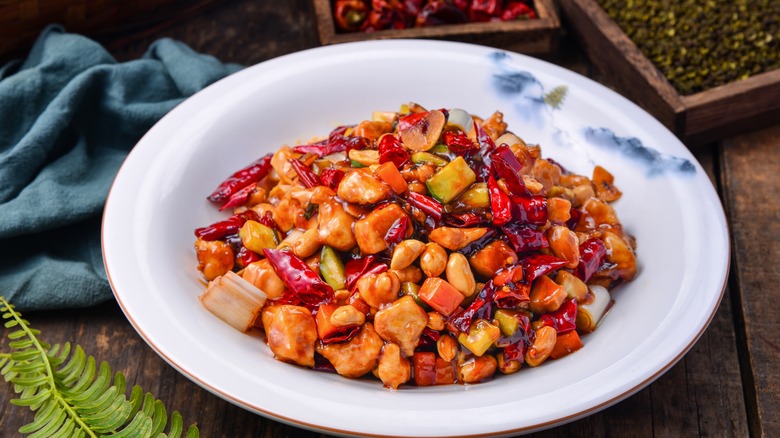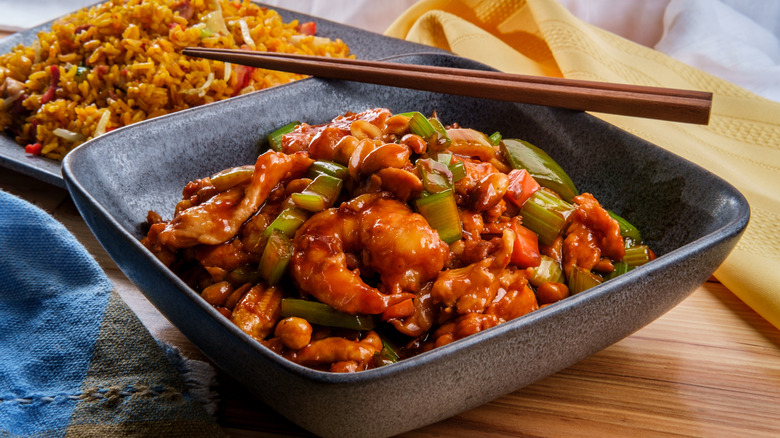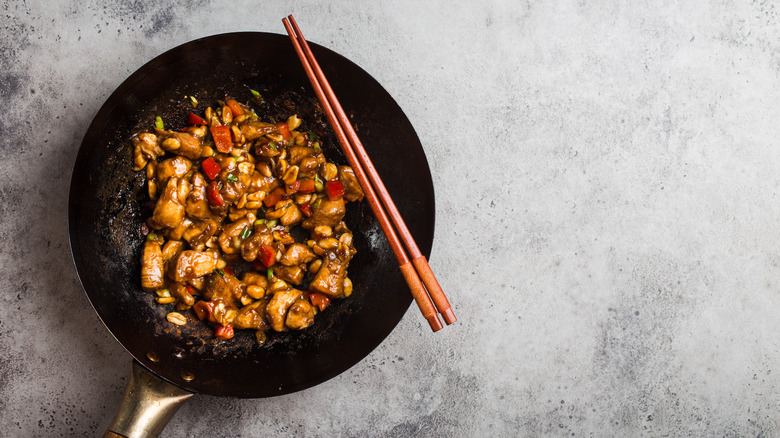It Turns Out Kung Pao Chicken Gets Its Name From A Real Person
There are plenty of dishes you can find at pretty much any Chinese restaurant in America — General Tso's chicken, beef with broccoli, egg drop soup, sweet and sour pork — but perhaps none is as ubiquitous as Kung Pao chicken. There are various ways to make it, with differences involving the sauce composition. Some kinds involve hoisin sauce, while others are based on white wine, soy sauce, and sesame oil. But there are also commonalities, namely chicken, chili peppers, and peanuts.
But unlike a lot of other common American Chinese dishes (such as nearly all of the ones listed above except egg drop soup), Kung Pao chicken is legitimately authentic; it was created in China and dates back to the 19th century and the Qing Dynasty. It was also named after a real guy — though his name wasn't "Kung Pao." Instead, this is one of many historical cases of bastardized translations altering the name of a dish: Originally it was called "Gong Bao chicken."
Kung Pao chicken gets its name from a mistranslation
These altered translations happen a lot in various languages, but they're especially common when it comes to the Chinese languages of Mandarin and Cantonese. The revered teacher Confucius wasn't named "Confucius" at all, for example; his name was Kong Fu Zi, literally "Master Kong." It happens with food, too; "chow mein," for example, is an Americanization of the actual term for the noodle dish: "chao mian." Westerners can't help doing this with languages that often prove tricky to them in pronunciation.
So it was with a man named Ding Baozhen and his beloved chicken. During the 19th century with the Qing Dynasty — the last dynasty of Imperial China — still going strong, Ding was a well-known government official with the title of "palace guardian" for his work as the tutor to the Imperial princes. "Palace guardian" is where "Gong Bao" comes from, because that's literally what Gong Bao means.
Gong Bao loved his chicken deeply and passionately
And by all accounts, Ding Baozhen/Gong Bao absolutely loved him some chicken. This isn't a situation with General Tso's chicken, where a dish was named after a completely made-up connection to a historical figure (in that instance, an actual historical general named Tso Zongtang); everyone seems to agree that Gong Bao's desperate love of this dish is where it got its name. Everywhere he lived — Guizhou, Shandong, Sichuan — he was well-known for eating a ton of it, as well as making it a point to serve it to his guests. It's often associated with Sichuan thanks to it achieving its final form (including those signature chili peppers) there, but there's strong evidence he readily consumed versions of it everywhere he went.
Eventually, when the dish made its way to the West, Ding's title was Latinized to Kung Pao and the rest is history. So next time you enjoy a nice bowl of Kung Pao, just remember that it should actually be called Gong Bao (or even Ding Baozhen) chicken.


